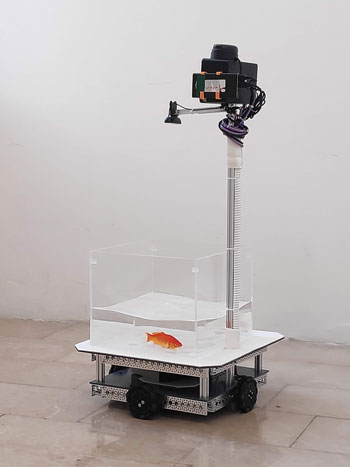 Our study is devoted to navigation which is a critical ability for animal survival. Given their fundamental role and universal function in the animal kingdom, it is only natural to test whether navigation capabilities are dependent on species and brain structures, or whether they share general and universal properties.
Our study is devoted to navigation which is a critical ability for animal survival. Given their fundamental role and universal function in the animal kingdom, it is only natural to test whether navigation capabilities are dependent on species and brain structures, or whether they share general and universal properties.
To address this question, we adopt a novel strategy which is the domain transfer methodology, where one species is embedded in another species’ environment to cope with an otherwise familiar (in our case navigation) task. For this purpose, we study the navigational ability of a goldfish in a terrestrial environment. We trained goldfish to use a Fish Operated Vehicle (FOV), a wheeled terrestrial platform that reacts to the fish’s location and orientation in its water tank in order to change the vehicle’s, i.e., the water tank’s, position in the arena. In a sense, the FOV is an inverted submarine for fish. Similar to a submarine which allows humans to explore the underwater world, the FOV enables a fish to explore a terrestrial environment.
Photo credit: Shachar Givon and Matan Samina
To test the ability of the goldfish to operate the FOV and navigate in a terrestrial environment, the fish were tasked to “drive” the FOV towards a visual target, observable through the walls of the tank. The fish were indeed able to operate the vehicle, explore the new environment, and reach the target regardless of the starting point, all while escaping dead-ends and correcting location inaccuracies. These results demonstrate how a fish was able to transfer its navigation skills to a wholly different terrestrial environment, supporting the hypothesis that the former possess a universal quality that is species independent.
Video of Fish Operated Vehicle
|
HFSP award information Research Grant - Program (RGP0016/2019): Navigating the waters – A neural systems approach to spatial cognition in in fish Principal investigator: Jacob Engelmann, Bielefeld University, Germany |
In the media


































